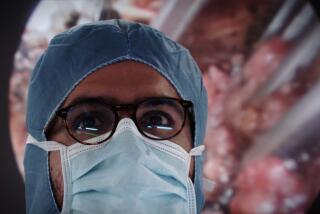Medical history gets an extensive work-up
- Share via
Surgery is a terrifying enough proposition on its own. But the thought of it can be tolerable as long as the surgeon is stable, calm, competent, reassuring, caring, omnipotent ... in other words, Gandhi in scrubs.
The last person we want cutting into us is anyone describing himself as a “maverick” or “eccentric.” Yet modern medicine would be a far scarier proposition were it not for the risk-takers, even outlaws, responsible for the technology that has made previously life-threatening surgical procedures routine today.
These bad boys of medicine take center stage in the History Channel’s four-hour miniseries “Mavericks, Miracles & Medicine,” which began Tuesday and continues through Friday at 8 p.m. By skillfully weaving medical history with real surgical procedures at modern hospitals, the series shows how the seemingly outrageous escapades of one person have influenced contemporary surgery.
Take Andreas Vesalius, for example. Had he not, as a medical student in the 1500s, stolen bodies from local cemeteries to study their bones, he might not have created the first atlas of human anatomy. Before Vesalius, no one was allowed to dissect a human body.
Dr. Werner Forssmann may have done him one better. Prohibited from experimenting on patients, Forssmann in 1929 cut into a vein in his forearm and threaded a catheter into his own heart. Then he calmly X-rayed himself to make sure he had accomplished this feat.
Forssmann, who later received the Nobel Prize for his work, catheterized himself nine times over the years to help perfect this procedure, which is used routinely today.
Even that accomplishment might pale next to the invention of anesthesia, which -- believe it or not -- was not routinely used in surgery until the mid-1800s.
A weird triumvirate of two dentists and a chemist introduced ether and laughing gas to surgeons at Massachusetts General Hospital and -- voila! -- gone were the days of hefty men holding down a howling patient as the doctor sawed off a leg.
The first hour of the series focused on the heart; tonight’s is on infectious disease, followed by segments on transplants and the brain.
All this is tied up neatly by director and writer Jeffrey Tuchman and narrated with calmness, stability and omnipotence by “ER” star Noah Wyle, who is not Gandhi in scrubs but plays one on TV.
*
‘Mavericks, Miracles & Medicine’
Where: History Channel
When: Tonight, Thursday and Friday, 8 p.m.






